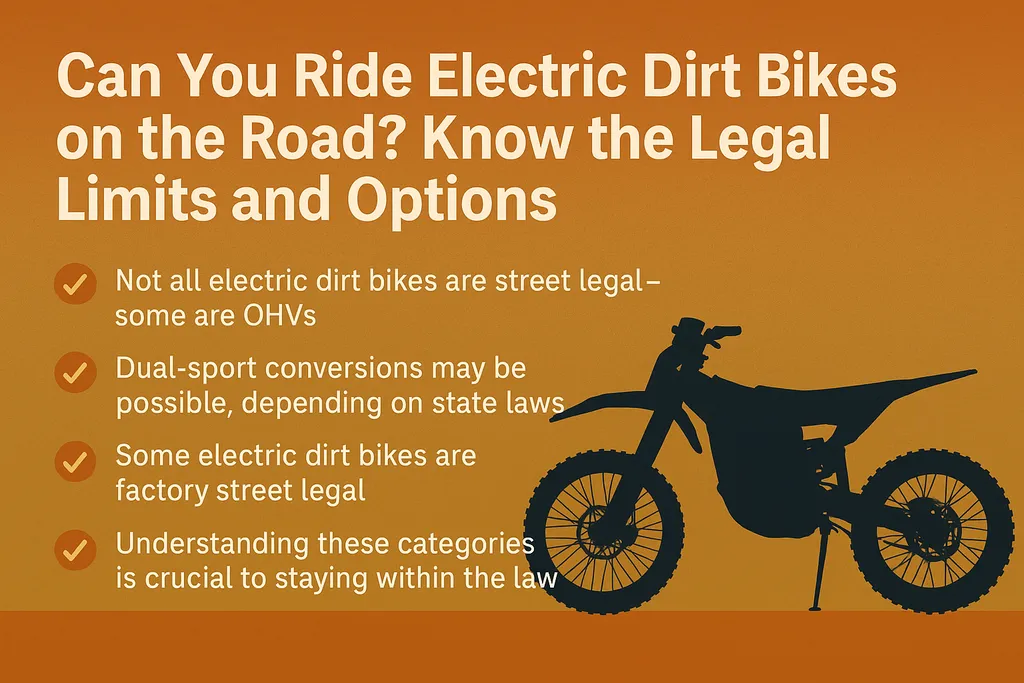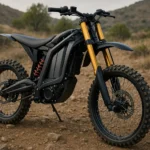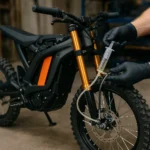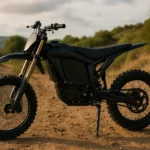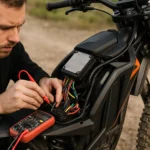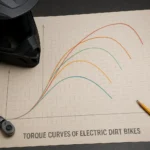Can you ride electric dirt bikes on the road? It’s one of the most common questions we get—and for good reason.
🧠 While electric dirt bikes are exploding in popularity, not all of them are legal to ride on public roads.
Some are strictly off-road vehicles (OHVs), while others can be converted into dual-sport machines, and a few are born ready with full street legal credentials.
So, can you ride electric dirt bikes on the road without getting pulled over or slapped with a fine?
The answer depends on the type of bike you own, your state’s laws, and whether your ride meets street legal standards like lights, mirrors, and registration.
Let’s break it down, because the line between trail toy and asphalt warrior isn’t always obvious. 🚦
Key Takeaways
- The phrase “can you ride electric dirt bikes on the road” isn’t a simple yes or no—it depends on classification.
- OHVs (off-highway vehicles) are not street legal and can’t legally be ridden on roads or highways.
- Dual-sport conversion kits can make some models road-ready—but they involve paperwork, inspections, and legal parts.
- Some electric dirt bikes come factory-ready for street use, with VINs, turn signals, and DOT-approved components.
- Knowing the difference can help you avoid tickets, bike impoundment, or worse.
⚡ Need the quick version? Skip ahead to the section you care about most using the links below 👇
What “On the Road” Actually Means for Electric Dirt Bikes
When people ask “can you ride electric dirt bikes on the road”, what they really mean is: Can I take this thing beyond the dirt trail without breaking the law?
Sounds simple—but it’s not.
“On the road” can mean different things depending on where you live. For some, it’s cruising through neighborhoods or riding short stretches of rural pavement.
For others, it means full-on commuting through urban streets or even hitting highways (spoiler: that’s usually illegal unless your bike is fully registered).
🛣️ Can you ride electric dirt bikes on the road if it’s just a quiet backroad? Only if your bike qualifies as street legal in your state.
Riding an OHV in public spaces—even a few blocks—can lead to fines or bike confiscation. Local police are trained to spot non-compliant rides from a mile away.
To be clear, electric dirt bikes that aren’t street legal are restricted to private property, trails, and designated OHV parks.
If you go beyond those zones, you’re rolling the dice.
If you’re not sure where your local roads fall on the legal spectrum, check your city or county’s municipal codes.
Every state has different rules, and some cities enforce them harder than others.
Remember: when asking can you ride electric dirt bikes on the road, the keyword is legally—not can it physically ride.
🧠 Big difference.
You can always check our main guide on street legality for a full overview of what makes a dirt bike roadworthy.
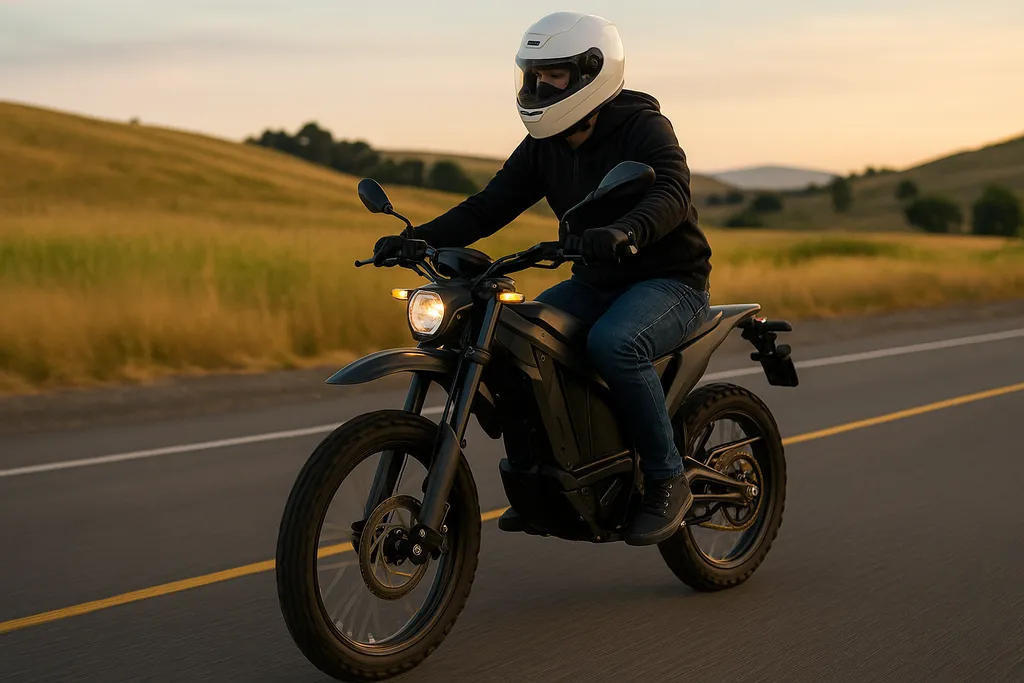
Understanding the 3 Legal Categories of Electric Dirt Bikes
To truly answer can you ride electric dirt bikes on the road, you need to know which of the three categories your bike fits into.
Not all electric dirt bikes are created equal—and not all are street-approved. Let’s break them down:
What Are OHVs (Off-Highway Vehicles)?
OHVs are strictly off-road machines. Think Sur-Ron Light Bee X, Talaria Sting, or Razor MX models.
These bikes are designed for dirt tracks, private land, or designated OHV parks—not public streets.
Even if they look like regular motorcycles, OHVs lack the legal equipment to be roadworthy: no turn signals, no horn, no mirrors, no VIN, and usually no title.
So, can you ride electric dirt bikes on the road if it’s an OHV? Nope. ❌ You’ll be breaking the law.
And yes, we’ve seen folks try—until the cops showed up. 😬
Dual-Sport Conversions: Riding the Legal Line
Some riders try to convert their off-road e-bikes using dual-sport kits. These add street-legal parts like headlights, mirrors, and brake lights. Sounds like a solution, right?
Well… kind of.
Can you ride electric dirt bikes on the road after a dual-sport conversion? Maybe—but only if:
- Your state allows OHV-to-motorcycle conversions
- You pass an inspection at the DMV or state patrol
- You obtain a proper title and license plate
It’s a paperwork-heavy path, and not every state makes it easy (looking at you, California 🔍).
Still, if done correctly, this route can legitimize your dirt beast.
Factory Street Legal Electric Dirt Bikes
The cleanest solution? Buy a bike that’s already street legal. These electric dirt bikes roll out of the factory fully equipped with:
- DOT tires
- Functional lights and signals
- Rearview mirrors
- A VIN
- Title and registration paperwork
Can you ride electric dirt bikes on the road if they come factory-legal? Absolutely—yes! ✅
Top examples include:
- Cake Kalk INK SL
- Zero FXE
- Onyx RCR
These bikes are electric dirt DNA meets asphalt-approved design. You pay more up front, but skip the conversion hassle and legal limbo.
Understanding this trio—OHVs, dual-sport conversions, and factory street legal models—is the foundation for answering can you ride electric dirt bikes on the road.
Without knowing where your bike fits, you’re riding blind. 🧭
7 Key Requirements to Make Your E-Dirt Bike Street Legal
So, you’re still asking: can you ride electric dirt bikes on the road if you upgrade the bike yourself? You might—but only if it checks all the legal boxes.
Here are 7 essential requirements most states demand before your electric dirt bike earns street rights. Miss one, and you’re back to being off-road only. ⚠️
1. DOT-Approved Tires
Off-road knobbies won’t cut it. You’ll need tires stamped with DOT (Department of Transportation) approval. These provide the traction, durability, and safety for pavement use.
2. Working Headlight With High/Low Beam
Many OHVs come with weak trail lights—not enough. You need a proper headlight with switchable high and low beam functionality. Visibility is everything.
3. Brake Light and Tail Light
Your rear end needs to light up—literally. A brake-activated light is mandatory. Some states also require the tail light to stay on when the engine is running, day or night.
4. Front and Rear Turn Signals
Yep, even if you use hand signals. Most street legal builds must have blinking turn signals at both ends. Don’t forget to wire them cleanly—messy setups can lead to inspection fails.
5. Rearview Mirrors
At least one side mirror is required in most states, but two is safer and more commonly accepted. Bonus points if they don’t vibrate like crazy at speed. 🪞
6. Functional Horn
No horn, no plate. Whether it’s electronic or mechanical, your bike needs to alert others on the road. Don’t be that silent ninja… it’s dangerous. 🫢
7. Title, VIN, and Registration
This is the big one. Can you ride electric dirt bikes on the road without paperwork? Absolutely not. You need a valid Vehicle Identification Number (VIN), a title, and street registration. No shortcuts here.
These aren’t optional if you want to hit the road. Even if your electric dirt bike feels fast and smooth enough for city riding, it won’t be legal without these mods.
So, before you twist the throttle into traffic, ask yourself:
✅ Have I met all 7 requirements?
✅ Can I prove it to a cop or DMV officer?
That’s the only way to confidently answer “yes” when someone asks can you ride electric dirt bikes on the road.
Can You Ride Electric Dirt Bikes on City Streets or Just Trails?
Alright, let’s get into the nitty-gritty. Can you ride electric dirt bikes on the road through your city, or are you stuck on dusty trails?
🤔 The answer depends on where you are and what type of bike you’re riding.
What Local Laws Usually Say
In most U.S. states, only street legal electric dirt bikes can legally ride on public roads, city streets, and highways.
If your bike doesn’t have a license plate, registration, and all the required safety features—it’s considered an OHV (off-highway vehicle) and can’t be used on the street.
Even if it’s electric, even if it’s quiet, and even if you’re “just going to the store real quick” — it’s still illegal. 🛑
So next time someone asks, can you ride electric dirt bikes on the road, the follow-up should be: “What does your DMV say about it?”
Where to Find Your City or County’s Rules
Each city or county may have slightly different interpretations of state laws, especially when it comes to off-road vehicles.
Some places allow OHVs on low-speed roads, while others ban them entirely—even on sidewalks.
Your best move?
🔍 Check your local Department of Motor Vehicles (DMV) or city’s municipal code. A quick call or website search can save you a fat fine or worse—bike impoundment.
For a broader overview of how electric vehicle laws vary by state, check out this electric bike law database from the National Conference of State Legislatures.
It’s an excellent resource to compare what’s allowed and what’s not across the U.S.
Example: NYC vs. Texas vs. California
Let’s look at how the rules shift across states:
- New York City: OHVs, including electric dirt bikes like the Sur Ron, are strictly banned on all public roads. NYPD will seize and destroy illegal bikes.
- Texas: More lenient. Dual-sport conversions are allowed if you meet state inspection requirements. Just don’t ride without paperwork.
- California: Tough love. Street conversions are technically allowed, but passing inspection is notoriously difficult. You’ll need full compliance and paperwork that’s 100% accurate.
So, can you ride electric dirt bikes on the road in cities?
✅ Yes—if your bike is street legal.
❌ No—if it’s an OHV or unregistered.
Every city has its own vibe—and its own ticket book. 🧾 Ride smart.
The Big Mistake: Riding OHVs Like They’re Street Legal
Here’s where a lot of riders mess up. They think, “It’s just electric—how bad can it be?” But let’s be clear: can you ride electric dirt bikes on the road if it’s an OHV? Absolutely not—and pretending otherwise can cost you big time 💸
Real Fines and Penalties Reported by Riders
Across the U.S., OHV riders caught on public roads are getting hit with:
- Fines ranging from $150 to $1,000
- Bike impoundment (sometimes destroyed in cities like NYC)
- Points on your driving record (yes, even for e-bikes!)
- In some states, misdemeanor charges for repeat offenses
Imagine getting pulled over on your way to school or work—and leaving without your ride. Not a good look.
Can Police Tell the Difference Instantly?
Oh yes. 🚨 Cops don’t need to pop the seat to know what’s what.
Most OHVs don’t have license plates, turn signals, mirrors, or even a visible VIN. If you’re missing any of those, you’re basically asking to get pulled over.
In places like California or New York, enforcement is especially aggressive.
Even in more relaxed states, can you ride electric dirt bikes on the road and assume nobody will notice?
Not likely. And with more electric dirt bikes on the streets, law enforcement is catching on fast.
Why Insurance Doesn’t Cover You in These Cases
Here’s another kicker—insurance won’t back you up if your ride wasn’t legal to be on the road in the first place.
Let’s say you get into an accident. If your electric dirt bike is unregistered and uninsured, you could be personally liable for all damages—even medical bills or lawsuits.
That’s a nightmare you don’t want. 😰
Bottom line: Don’t treat your OHV like a legal motorcycle unless it truly is.
Just because it can roll on asphalt doesn’t mean it should.
So before someone asks you again, can you ride electric dirt bikes on the road, you’ll know how to answer without ending up in court.
How to Know If Your Bike is Street Legal — A 5-Minute Checklist
Still unsure? Wondering can you ride electric dirt bikes on the road with your current setup?
Don’t guess—run through this quick checklist and find out in under 5 minutes 🕵️♂️
1. Does It Have a VIN?
A Vehicle Identification Number is a must. If your frame doesn’t have one clearly stamped, odds are your bike isn’t eligible for road use. Most OHVs skip this entirely.
2. Are the Tires DOT Approved?
Flip your bike and look at the tire sidewalls. If it doesn’t say DOT, it’s not approved for pavement. Even the best off-road tires won’t cut it for legal road use.
3. Is There a Headlight With High/Low Beam?
No dim trail light nonsense—this has to be a fully functional switchable headlight. Most states will test this during inspection.
4. Are There Turn Signals, Brake Light, and Mirrors?
You need front and rear turn signals, a bright brake light, and at least one rearview mirror (but usually two). No excuses here—it’s required in almost every state.
5. Do You Have a Title and Registration?
This one’s the dealbreaker. If you bought your bike without a certificate of origin or title, you probably won’t be able to register it.
No registration = no license plate = no street riding.
So, can you ride electric dirt bikes on the road with missing papers? You already know the answer: nope. ❌
Bonus Tip: Call Your DMV First
Before buying a bike or conversion kit, call your local DMV and ask what’s allowed in your area.
A 3-minute call can save you months of frustration.
If you answered “yes” to all of the above, congrats—your ride might be ready for the streets!
If not, don’t push your luck. Stick to the trails and ride smart. 🤘
Knowing this checklist inside and out gives you a huge edge—and lets you confidently answer can you ride electric dirt bikes on the road when someone asks.
Best Street Legal Electric Dirt Bikes in 2025 (Top 3 Picks)
Now that we’ve broken down what makes a bike roadworthy, let’s answer the golden question in a fun way: can you ride electric dirt bikes on the road right out of the box?
If you want to skip conversions and headaches, here are 3 street legal electric dirt bikes you can ride straight from the showroom to the street 🏁
1. Zero FXE – The Urban Warrior
With its aggressive styling and powerful acceleration, the Zero FXE is one of the most popular factory street legal electric bikes out there. It comes with:
- A full VIN and registration documents
- LED lights, mirrors, and blinkers pre-installed
- Top speed around 85 mph
- Range of up to 100 miles in city mode
If you ask can you ride electric dirt bikes on the road legally and safely, the FXE is a confident “yes”.
2. Cake Kalk INK SL – The Scandinavian Minimalist
Sleek, silent, and street-ready, the Kalk INK SL is a dual-purpose bike built with precision.
- Lightweight frame (under 170 lbs)
- Top speed near 60 mph
- Street-legal components installed by default
- Smooth ride for both urban and light trail environments
This bike doesn’t just look legal—it’s engineered for asphalt.
3. Onyx RCR – Retro Style Meets Modern Torque
Want something that blends café racer vibes with real electric power? The Onyx RCR delivers:
- 72V motor, peaking at 60+ mph
- Pedals included (yes, you can “fake” it as a moped 😎)
- Lights, horn, mirrors, and plate mount ready to go
- VIN provided for easy registration in most states
The Onyx RCR walks the line between e-bike and e-moto, making it a smart loophole option for riders in stricter states.
When people ask can you ride electric dirt bikes on the road, these models are your no-brainer answers.
They’re fast, fun, and fully legal—no hacks or shady mods required.
Are Dual-Sport Conversions Worth It? Pros vs. Hassles
So you’ve got an off-road beast and you’re wondering, can you ride electric dirt bikes on the road if you convert it yourself?
It’s tempting—and yes, it’s possible. But is it worth the effort? Let’s weigh the good and the bad ⚖️
Pros of Converting Your Electric Dirt Bike
1. Save Money Upfront
Instead of buying a new street legal e-bike, you can spend a few hundred bucks on a dual-sport kit (lights, horn, mirrors, etc.) and get things rolling.
2. Keep the Bike You Love
Already attached to your Sur Ron or Talaria? No problem. Converting it means you don’t have to switch bikes—you just upgrade your current setup.
3. Customize It Your Way
Build it to match your riding style. Want slick mirrors and LED signals? You pick every part. It’s a great option for DIY lovers and tinkerers.
Hassles That Can Kill Your Buzz
1. State Laws Are Inconsistent
Even if your bike looks legal, that doesn’t mean your DMV agrees. Some states (like California) make it nearly impossible to title a converted OHV.
2. Inspections Can Be Brutal
You might pass all the technical requirements—but still fail the inspection due to a missing certificate, vague VIN, or non-compliant part.
3. Time-Consuming Paperwork
Getting through the bureaucracy is no joke. Titles, safety checks, registration, emissions forms—some riders give up halfway through.
4. Not Always Insurance-Friendly
Even if your bike gets plated, some insurers won’t cover a converted OHV. That means you’re still riding without full protection.
Final Verdict?
Can you ride electric dirt bikes on the road after a conversion? Technically yes, but only if your state allows it and you nail the process.
If you love mods and enjoy red tape (🧾 lol), go for it. But if you want to ride now and avoid legal drama, it’s safer to go with a factory street legal model.
Real Rider Stories: Getting Caught Riding Illegally
We’ve talked a lot about the “rules”—but let’s get real. What actually happens when you ignore the laws and assume can you ride electric dirt bikes on the road is just a matter of opinion?
Here are some raw stories from riders who learned the hard way. 😬
“I Thought It Was Street Legal—Until the Cop Pulled Me Over”
“I bought a Sur Ron off Facebook and assumed it was good to go. It had lights and mirrors, so I figured I was covered. I was barely two blocks from home when a patrol car stopped me. The officer ran the VIN—nothing came up. He gave me a $475 ticket and warned me if he saw me again, he’d impound it.”
— Jason P., Florida
“My OHV Got Impounded Because I Was on a Public Road”
“I was riding my Talaria on a quiet backroad, not bothering anyone. But someone called it in. A sheriff showed up and said the bike wasn’t legal for the street. No plate, no insurance, no DOT parts. They towed it and I had to pay $300 just to get it out.”
— Maya D., Texas
“How I Got My Dual-Sport Kit Approved (Finally)”
“It took me 3 DMV trips, a trip to CHP inspection, and a call to the manufacturer, but I finally got my converted bike registered. The trick was making sure the VIN matched the paperwork and every part I installed had DOT markings. Took 6 weeks but I did it.”
— Rafael S., California
These aren’t just stories—they’re warnings ⚠️.
When people casually ask can you ride electric dirt bikes on the road, most don’t realize there’s a difference between possible and legal.
Learn from others before you become the next cautionary tale. 📚
Frequently Asked Questions (FAQs)
Even after all this, we know some of you still have lingering questions about can you ride electric dirt bikes on the road. Totally fair—this topic gets murky fast. Let’s clear up the most searched doubts 🔍
Can you ride a Sur Ron on the road legally?
Only if it’s been properly registered, fitted with DOT parts, and approved by your DMV. Out of the box, the Sur Ron Light Bee X is an OHV, meaning it’s not street legal.
Do I need a license to ride electric dirt bikes on public roads?
Yes—if the bike is considered a motor vehicle in your state. That usually means it has a VIN, is registered, and exceeds local speed/power limits. In that case, you’ll likely need a driver’s license and sometimes even a motorcycle endorsement.
Can I get insurance for my electric dirt bike?
If it’s street legal and registered, yes. You can insure it like any motorcycle. But if it’s not registered, most insurers won’t touch it—even for liability coverage.
Is converting an OHV into a street legal bike legal everywhere?
Nope. Some states ban this entirely. Others allow it with inspections, paperwork, and compliance with DOT standards. Always check with your local DMV or highway patrol before spending money on a conversion kit.
Are there electric dirt bikes that are street legal out of the box?
Yes! Bikes like the Zero FXE, Cake Kalk INK SL, and Onyx RCR are built to meet all street legal requirements and come with the right documentation to get plated.
Can kids ride electric dirt bikes on the street?
In most states, no. Even if the bike is small, it still requires registration and a licensed operator if it’s used on public roads. Kids can ride on private property or trails, but not in neighborhoods unless the local laws say otherwise.
Got more questions about can you ride electric dirt bikes on the road? Drop them in the comments and we’ll update this section with answers from the community! 💬
Ready to Ride Smart? Share Your Experience and Join the Conversation
We’ve covered a ton—from OHVs and dual-sport conversions to fully legal electric dirt bikes.
So next time someone asks can you ride electric dirt bikes on the road, you’ll have the answer—and the facts to back it up. 💪
But this guide isn’t just about info—it’s about community.
We want to hear from you:
- Are you riding legal or working on a conversion?
- Have you had any run-ins with law enforcement?
- Found a loophole in your local laws?
- Got tips on inspections or insurance?
👇 Drop your experience in the comments below and help another rider avoid costly mistakes.
And if this guide helped you, share it with a friend or on your favorite e-bike group—you might just save someone from losing their bike. 🛑🚓
The more we share knowledge, the more we all win.
Ride electric. Ride smart. Ride free.
Still hungry for more insights?
Don’t miss our ultimate guide that dives even deeper into electric dirt bike laws across all states:
👉 Are Electric Dirt Bikes Street Legal? Everything You Need to Know
It’s the perfect next step after understanding can you ride electric dirt bikes on the road—so you ride smarter, safer, and 100% legal.

Tyler Brooks is the storyteller behind most of the content at Electric Dirt Zone. With over 10 years of experience in digital media and a lifelong love for off-road riding, he blends technical insight from the team with engaging, down-to-earth writing. When he’s not turning dusty trail rides into blog posts, you’ll probably find him snapping pics before things get too wild.

